
We are compelled to reflect deeply on what we have heard from those persons and communities most impacted by the violent intrusions of extractivism. We have heard the call to decenter ourselves. Now we turn to engage with the theological perspectives rising from the lands in which extractivism is exacting incredible wounds. These theologies push back against the oppressive anthropocentric and androcentric theologies that have come from the global north. Theological lenses serve to help us to see differently. They aim to decenter us so that we might listen more deeply to voices that may be unfamiliar to us, who are engaged in our own way of seeing and understanding. And so, in addition to our familiar Mercy lens, we turn to engage in an ecological liberation lens, an eco-feminist lens as well as the lens of Pope Francis’ integral ecology. These theological lenses will guide us in responding to the cries of those who have been made poor and to the cries of Earth.
For our theological reflection process, please read through the following lenses. While we will all use the Mercy lens, you are asked to choose and reflect on one additional lens:
Mercy Lens – A View Toward Harmony and Right Relationship in Our Suffering World
[Shortened version here]
Background: The Institute of the Sisters of Mercy of the Americas embraces the tradition of Catherine McAuley. We have been shaped by her vision and by her Gospel commitment to walk with those who are suffering in poverty. Following in her footsteps, we vow to be of service to persons who are made poor, persons who are sick and persons who are uneducated. We have continued to deepen our Mercy tradition in these contemporary times. In the course of our last three Institute Chapters (2005, 2011, 2017), we intensified our desire to live in solidarity with our suffering world and with all of God’s creation. We continually seek to transform ourselves toward greater integrity of word and deed.
“The God of Mercy, Wisdom and Mystery is calling us, as Sisters of Mercy of the Americas, an international and intercultural community, to deepen our relationship with God and one another, and to intensify our work in communion with others who seek a more just and inclusive world.”
Chapter 2017 Recommitment: Called to New Consciousness
Through an expressed commitment to our Critical Concerns, we give special attention to five interrelated areas of need in our suffering world – Earth, Immigration, Nonviolence, Racism and Women. We understand our commitment to these critical concerns must be considered within a broader context and in relation to each other.
Call to a New Consciousness
During the 2017 Institute Chapter, we deepened our commitment to listen to the cries of people, Earth, and communities most deeply impacted by extractive industries and to respond with “integrity and clear intention” to their demand for justice and the flourishing of life for all.
As Mercy, we are called to consider more profoundly our responsibilities to Mother Earth. We seek to live in harmony and interrelatedness with Earth, and to support the right of the Earth and her inter-related communities to fulfill their important roles in the ever-renewing processes of life (Berry 1999). The “demand to embrace our Critical Concerns through the lens of nonviolence” compels us to listen to the people and the communities, and Earth—which have been brutally impacted by extractivism. As Mercy, we are called to listen to the communities of color and indigenous communities, which continue to be disproportionately and violently impacted by extractive industries. Working to become an anti-racist congregation and to address our climate emergency, requires a recentering on the stories and experiences that drive our decision-making. We are called to explore what it means today for Mercy to stand in solidarity with communities harmed by extractive industries. With a listening heart, we strive to hear what these communities say to us about the actions that are needed to heal Earth. We seek to understand how we, as individuals and as community, are complicit in the climate crisis that is unfolding in our time.
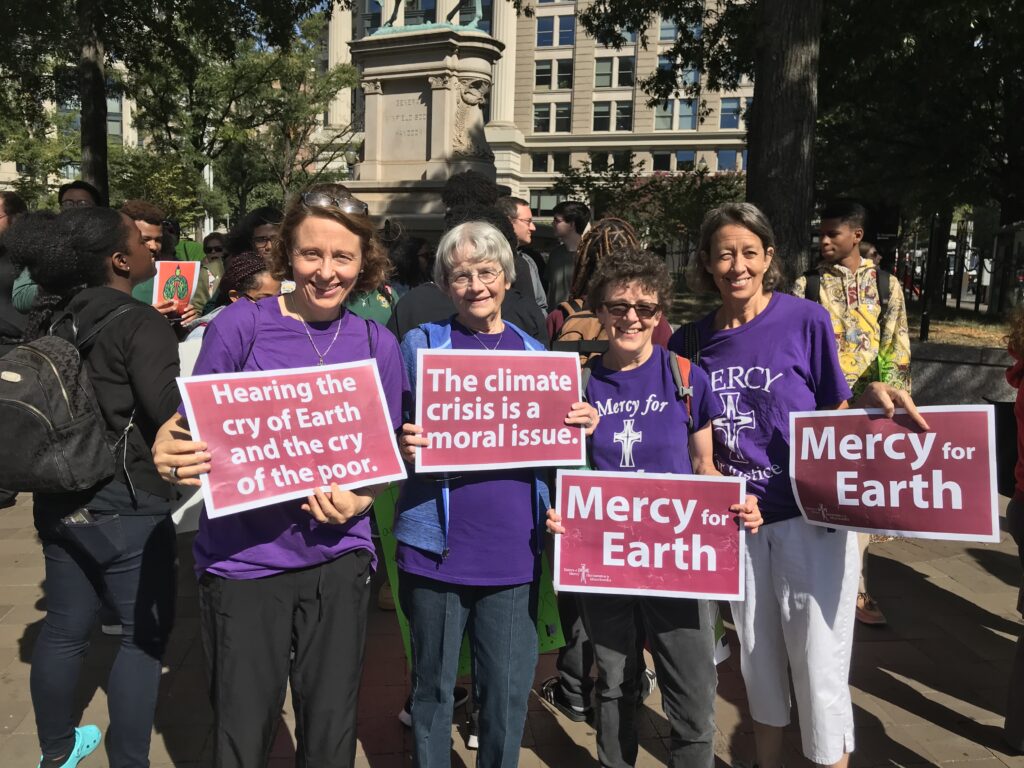
“Called in this moment to act,” we are compelled to respond to the impact of extractive industries on people, communities, and Earth. By committing ourselves to a decentered way of listening, seeing, and making decisions, we engage in decolonized analyses of our own structures and practices. We seek right relationship and harmony with the community of life, in which we strive to embrace a reciprocal, cooperative, and non-dominant stewardship with all of God’s creation.
“We hear the call of our suffering world. The impoverishment of peoples, the devastation of Earth and oppressive social norms and systems call us at this moment to act…To intensify our efforts to align our investments with our values and especially now, to pursue education and action against practices of extractive industries that are destroying people communities and Earth.”
Chapter 2017 Recommitment Statement
Key Points in Using a Mercy Lens:
- We serve the suffering of our world with a special commitment to our Critical Concerns.
- We work toward transformation of greater integrity in word and deed.
- We listen to the cries of communities demanding justice from where they stand and in their own experience.
- We seek right relationship and harmony with Earth’s community of life through reciprocal, cooperative and non-dominant relationships.
- We listen to the stories and experiences of others from a decentralized and decolonized place.
- We caution against the imbalance and destructive forces perpetrated by the dominance of the powerful, privileged, white, patriarchal, and capitalistic/imperialistic perspective.
Reflection Questions:
- What stays with you from this description of the Mercy lens?
- Is there a concept or element in the description that you need clarified? If so, what?
- What is the key word that speaks most to you about using a Mercy lens to analyze extractivism?
An Ecofeminist Theological Lens – God is Relatedness, God is Everywhere Present
[SHORTENED VERSION HERE]
The ecofeminist perspective of Ivone Gebara provides us a lens with which to examine the values and assumptions at work and in tension with anthropocentric theologies. This perspective challenges the patriarchal notion that humans are mandated by God to subdue and dominate Earth. She explains that language about God not only forms our theologies about God, but also shapes our behavior toward Earth and her vulnerable communities. When metaphors become literalized, the mystery of God is replaced by absolutism and rigidity of beliefs. Gebara proposes a metaphoric way of knowing God that expands beyond images. God is “relatedness.” Relatedness means that experience is a value and a way of knowing the mystery of God. Relatedness expresses presence, but “not something that can be reduced to some form of being.” Through this theological lens, Gebara adds, God can be “encountered in a variety of expressions.”
God is not out of touch in some transcendent realm and relating to us from afar with occasional and limited incarnational incursions (the traditional view of sacraments). Using Sallie McFague’s metaphor of the universe as God’s body, Gebara unites the immanence and transcendence of God. “Everyone and everything become potentially a sacrament of God.” The metaphors of God as relatedness and the universe as God’s body compel us to see Earth, creation, and ourselves differently in relation to one another. God is in all and all is in God. We cannot locate God. We cannot say God is here and not there. God is not a pure essence existing in itself, rather God is better symbolized as relatedness or relationship. When we speak of God, it is by means of relationships and relating. When we speak of God, it is out of our personal experience.

Gebara raises another theological point, that we are compelled to experience God as presence. The language of God’s presence and God’s absence is dualistic. How is God absent? To say that God is absent from creation, or stands outside of creation, places God in some ethereal space. These dualistic and hierarchical beliefs are patriarchal notions of God. They have led to all kinds of theologizing such as why this “remote” God does or does not answer the pleas of the poor or care about the suffering of “lowly creation.”
Gebara urges us to move beyond dualistic anthropocentric theologies that elevate human suffering above the suffering of other creatures and creation itself. She notes that many of us have been so embedded in anthropocentric values that eco-feminist views may strike us as strange, even pantheistic. But again, we cannot locate God here or there. When we pray as if God is out there, we locate God in some place outside of ourselves. In a sense, we objectify God. When we have not felt the integrated, interconnected, and interdependence of all things, it is harder for us to imagine God except in our own image and likeness.
The Bible is full of non-anthropocentric images of God, yet we have latched onto the human image because our worldview is embedded with patriarchal ways of seeing. The idea of a divinity, Gebara explains, that pervades all beings, times, and places has been dismissed by patriarchal voices as primitive and mythical. In order to subdue and dominate creation, patriarchal views hold to the notion that we must be better than and have a higher status than creation. But Gebara objects, we can no longer speak of God existing before creation as if there was some linear ordering of God first, then creation. There is no gap between the atemporality of God and the temporality of creation. God does not exist as a being separate from creation—God is always and everywhere present. By separating God radically from creation, we uphold God as an untouchable “moral reserve” that permits humans to leave an evil domain or evil actions. In effect, with God’s help, we can remove ourselves from what we have destroyed and leave it behind, or with a modern apocalyptic notion, we can believe it will all be replaced with a new and improved Earth.
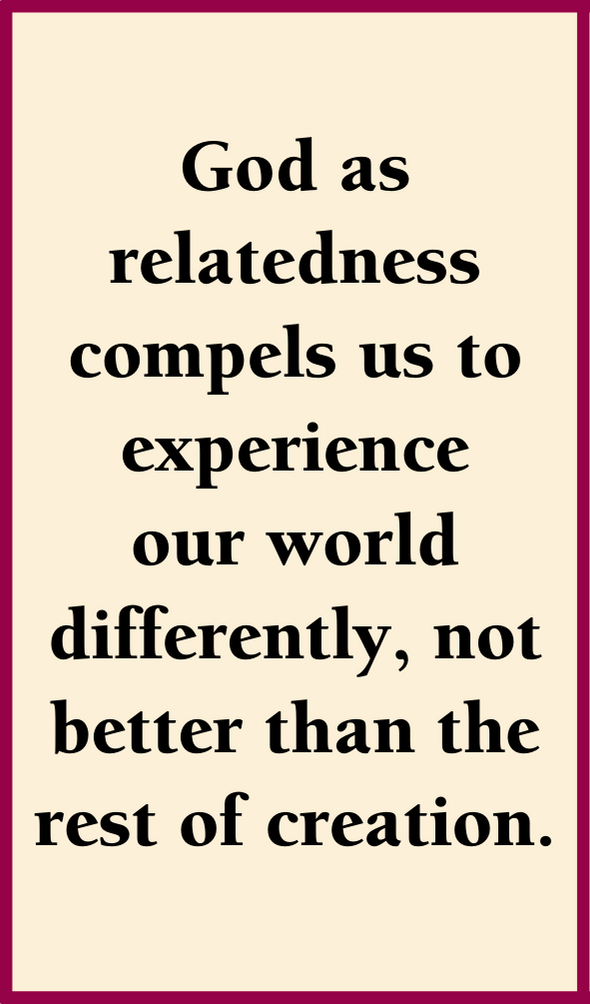
Why does Gebara’s eco-feminist lens matter? Why shift our way of perceiving God? Gebara says we will not solve the problems of human anguish and suffering with the traditional dualistic discourses that separate God’s presence from creation. We need a unitary and a very realistic perspective. We seek to understand and alleviate the suffering of Earth, of animals, of humans, not believing that one suffering is superior or inferior to the other. Relatedness is not a discourse about the “being” of God, but about what we perceive of the mysterious body of the universe to which we belong. This way of seeing challenges traditional discourses about God and reclaims metaphors for God from rigid literalist and dogmatic niches. We can expand our images of God, share experiences of God and move away from images of God that are no longer meaningful.
Gebara explains that the invitation to love and to be mercy does not come from a reality that is external to us; rather it is an urge that is present within our very humanity. Within our very being throbs an incredible attraction toward other beings, toward creation. We must allow our life experiences to be our first teacher.
Reflection Questions:
- How did your family and your childhood experiences shape your perspective of God? In what ways did your perspective of God shape your interactions with creation and creatures?
- In what ways has the community shaped your relationship to God and Earth? What did you find yourself letting go of? What inspired your change? How have your values shifted?
- What about Gebara’s theological lens challenged you? What about Gebara’s theological lens inspired you or affirmed your own experience of God?
- How is Gebara’s eco-feminist lens relevant to your discussion on extractivism?
- Which eco-feminist values create tension within you as you have listened deeply to experiences of trauma? What has emerged in you?
An Ecological Theology of Liberation – The Preferential Option for the Poor and the Problem of Plunder
[Shortened version here]
Theologian Daniel Castillo engages us through the influential lens of Gustavo Gutierrez’ theology of liberation but further develops it with an ecological lens. He also challenges, as does Gebara, the oppressive anthropocentric and androcentric theologies of the global north but sets these theologies within their Anthropocene context.
Daniel Castillo’s work provides us with context as he explains how the World Bank and developed countries such as the U.S. and European nations collaborated to shift dirty industries to the global south. Latin America and Africa became the dumping grounds for toxic waste and extracted resources. Castillo explains that we are in the midst of the sixth mass extinction. Extractivism is devastating the Earth’s ecosystems at unprecedented levels, and the poisoning of Earth’s land, air and water is occurring at unprecedented rates. Indigenous peoples, who live simply and in harmony with Earth, suffer greatly from the effects of extractivism. Their water and land have been seized, even at the cost to their own lives. The violence perpetuated by powerful economic and corporate forces is often sustained by oppressive governmental forces.
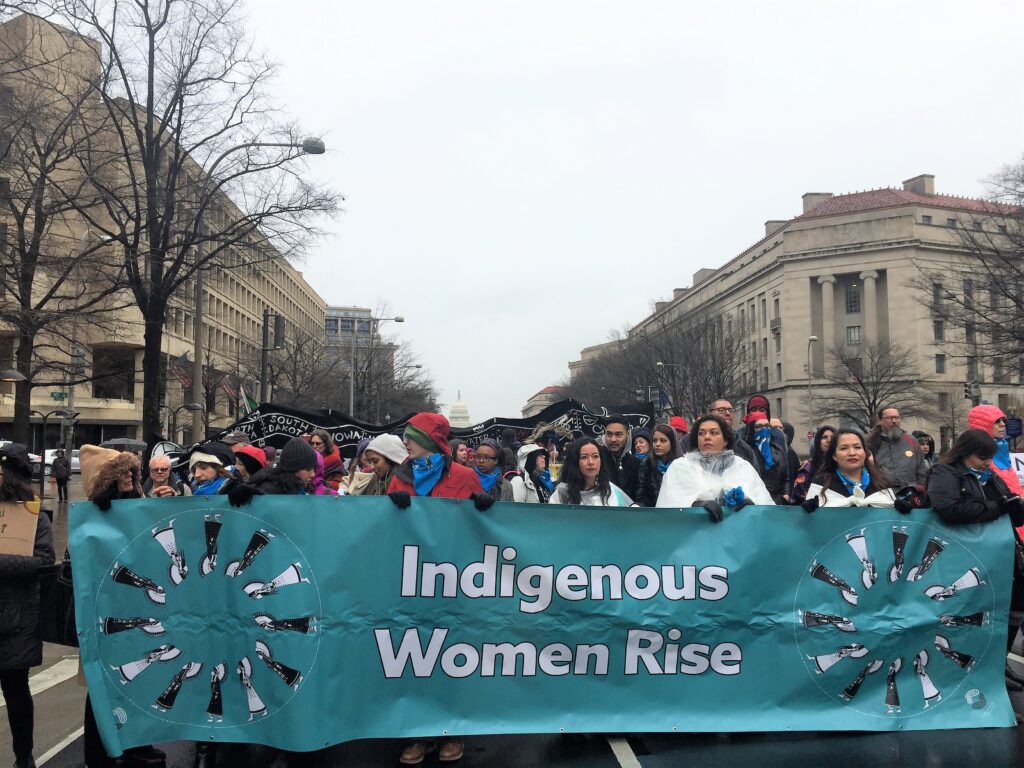
For Castillo and other liberationists, responding to the evils of extractivism requires us to rethink our cosmological perspective. The idyllic view that we are part of the grand scheme of God’s creative process stands in stark contrast to the evolutionary perspective in which humans are evolving as complex creatures through triumphalist behaviors.
Castillo argues that we may indeed experience a greater sense of connectedness with creation when we see everything as composed of stardust, but this grand unified feeling does not help us deal with harsher realities. How do we respond to genocides, to climate change, and to viruses as these too are part of creation and composed of stardust? The universe story is not just some beautiful history of cosmology; it consists of the process of evolution that can be brutal as life evolves from simple to complex. The emergence of higher forms of life details a triumphalist account of history in which victors emerge, and it is their history that is celebrated. The cries of the Earth and of those who have been made poor have been and continue to be buried in triumphalist accounts. The historical reality of evolution is far starker and much messier than our idyllic view of cosmology lends itself to. Castillo urges a politico-ecological approach that seeks to illuminate the abuse of power within the world.
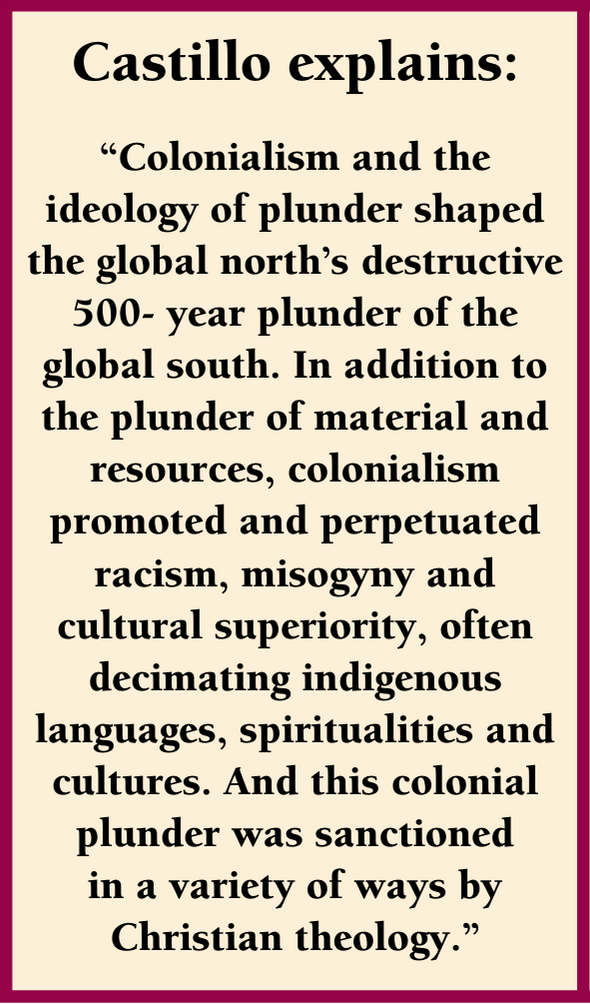
He begins with the anthropocentric biases inherited from medieval-era Christianity. Castillo points to a common Christian belief that God instructed humans to exploit nature for their use (a common misinterpretation of Genesis 1:26-27). Medieval theologies also desacralized the natural world with calls for Christians to separate themselves from worldly things and focus on otherworldly pursuits. The secular was made out to be dirty and ungodly. Humans were viewed as redeemable with souls that could be saved and elevated, while the natural world lacked a soul and existed only to serve humans (dismissing the idea that creation gives glory to God by its being). According to Castillo, this desacralizing process has both sanctioned and catalyzed the exploitation and domination of nature, which in turn, led to our current ecological crisis. With these anthropocentric views, we fail to see that humans are responsible before God for our actions. We must act with an understanding of who God is and what God desires. We are called to reevaluate old theologies and soteriologies that linger in us to assess whether we have seen what God really desires. Castillo points to understanding God’s self-disclosure in our Christian tradition (the Bible, doctrine, and other sources of tradition), but he also affirms nature as a source of God’s revelation (as elucidated by Pope Francis in Laudato Si). According to Castillo, Jesus embodies the desires of God when he offers good news to the poor and gives hope to the captives and adjures his followers to take care of the least ones (Matt 25:35-40) (897). The Beatitudes speak of God’s desire to bless the vulnerable (Matt 5:3-12 // Luke 6:20-25). Jesus proclaims God’s good news to the poor (Matt 11:5 // Luke 4:16, 7:22).
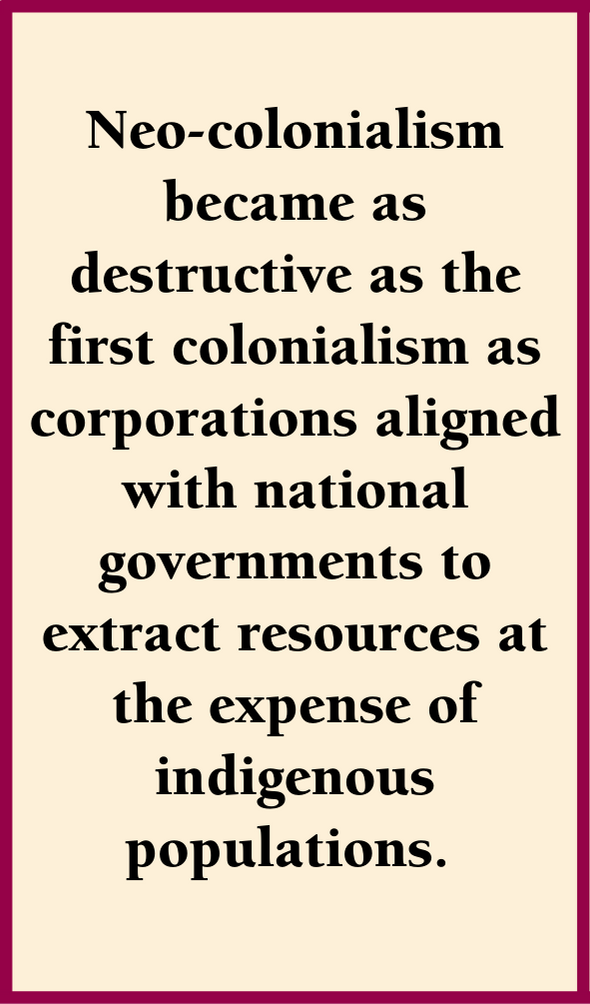
In the 1950s and 1960s, the influence of liberation theology took hold in Latin America. Its core tenet is the belief that the “preferential option for the poor” compelled communities to respond to the injustices oppressing and killing those who are poor and other marginalized peoples. Castillo explains that two divergent understandings of liberation theology and its emphasis on the “preferential option for the poor” began to emerge. On one hand, liberation theology urged a call to radical transformation on the part of God’s people that required participation in the struggle against psychological, political, cultural, and economic forces (908). On the other hand, supporting the causes for those who are poor and marginalized did not necessarily require a conversion of life. One could remain in a position of apathy but also remain in a place of non-involvement regarding structural transformation (908). Castillo argues that in its heart, liberation theology requires a community of believers to practice works of charity and mercy, but also and importantly, to confront and transform the socioeconomic, political, and cultural forces that produce injustices, material poverty and oppression (919). If the love of God and the desire of God is to be lived through a commitment to a preferential option for those who are poor, it demands conversion, which necessitates a reorientation of our lives and communities toward the service of transforming the world (919). How can conversion happen unless we are awakened and grow more deeply aware of our own participation in the oppression and injustices that affect the poor? We are called to see how our own ideologies contribute to these injustices. We are called to a new consciousness.
Castillo explains how colonialism and the ideology of plunder shaped relations between the two global hemispheres. In short, the North has plundered the global south for more than 500 years, driven by the Doctrine of Discovery and the Papal Bulls. He adds that this plunder was perpetuated by the ideology of plunder that incorporated racism, misogyny, and cultural superiority. And it was sanctioned in varying ways by Christian theology. In the aftermath of World War II, colonialism as we knew it began to collapse, but a new form of colonialism was on the rise, and it was being powered by the mythos of progress (938). While Castillo does not mention it, the rise of the Prosperity Gospel and its close theologies influenced the undercurrent of U.S. cultural values that to this day continue to plunder the global south. As the global south welcomed the decline of old colonialism, Castillo writes that President Harry Truman (1945-1953) urged an era of developmentalism. He advocated effectively for improving underdeveloped regions by bringing scientific advances and industrial development to them. In effect, he ushered in a neo-colonial era before the global south could construct and institute new paradigms for themselves (949). Their short-lived welcome of liberation from old colonialism reverted into a new kind of colonialism in which the global north used developmentalism and modernization to mask the plundering of the resources of the South (in labor, in land, in minerals and other resources).
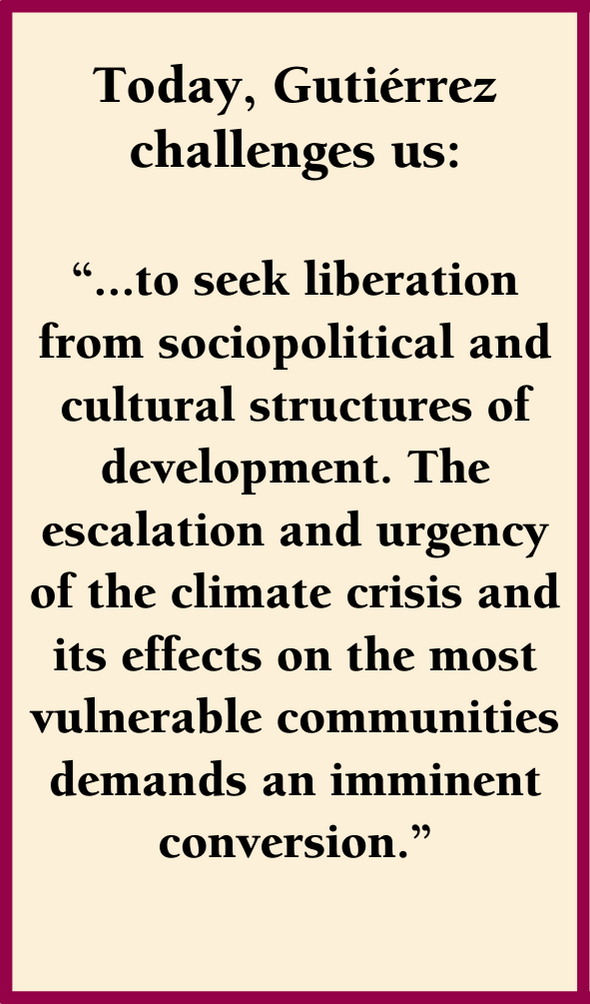
It was within this new era of neo-colonialism and in response to the violence and devastation that characterized it that Gustavo Gutiérrez, a Peruvian philosopher and theologian, first produced and put forth the ideas of liberation theology (1971). Essentially, he called forth a radical shift toward liberation and urged a break from the developmentalism. Castillo reminds us how Gutiérrez revealed the misleading and dangerous undercurrents legitimized and obfuscated by the rhetoric of development and modernization (981). He helped raise critical questions. What was really happening in the name of development and modernization, and how are these concepts of progress preventing real transformations? And furthermore, who is really benefiting from these concepts instituted by the global north? Gutiérrez’s call for liberation from sociopolitical and cultural structures of development requires an imminent conversion, not some delay into the distant future (981).
There are three essential points expressed in Gutiérrez’s liberationist lens.
First is his concept of salvation. He explains that salvation is not exclusively an afterlife otherworldly reality, but it is experienced in history and in communion with God. Salvation is not only liberation from sin, but also the experience of grace. Salvation occurs through experiences of communion and solidarity with the vulnerable and marginalized.
Secondly, Gutiérrez emphasizes what he means by “neighbor.” The neighbor includes most especially the poor and oppressed, because as he explains, the love of God is expressed through a profound love of “the least.”
Thirdly, Gutierrez emphasizes that solidarity with the poor requires a commitment to transform the structures and forces that produce poverty, oppression, and death. Cultural and structural sin, most especially in the guise of development, must be confronted with a radical break (993).
Castillo develops Gutierrez’s theology of liberation with an ecological lens by linking the cries of the poor to the cries of the Earth. The mythos of progress persists because it lures one by the idea of a better way of life, but in reality, only a few will benefit. For example, when multi-national companies seize land and water rights to develop labor-intensive projects (e.g., hydroelectric plants), they often bring in outside laborers and contractors. Once the projects are finished, people are left jobless and landless with their whole way of life upended. Castillo cites Pope Francis in saying that we cannot separate the human world from the natural world, because everything is connected. (no. 16, Laudato Si). An integral approach to ecology is needed. Transformation needs to occur on a cultural/psychological level and on socio-structural level.
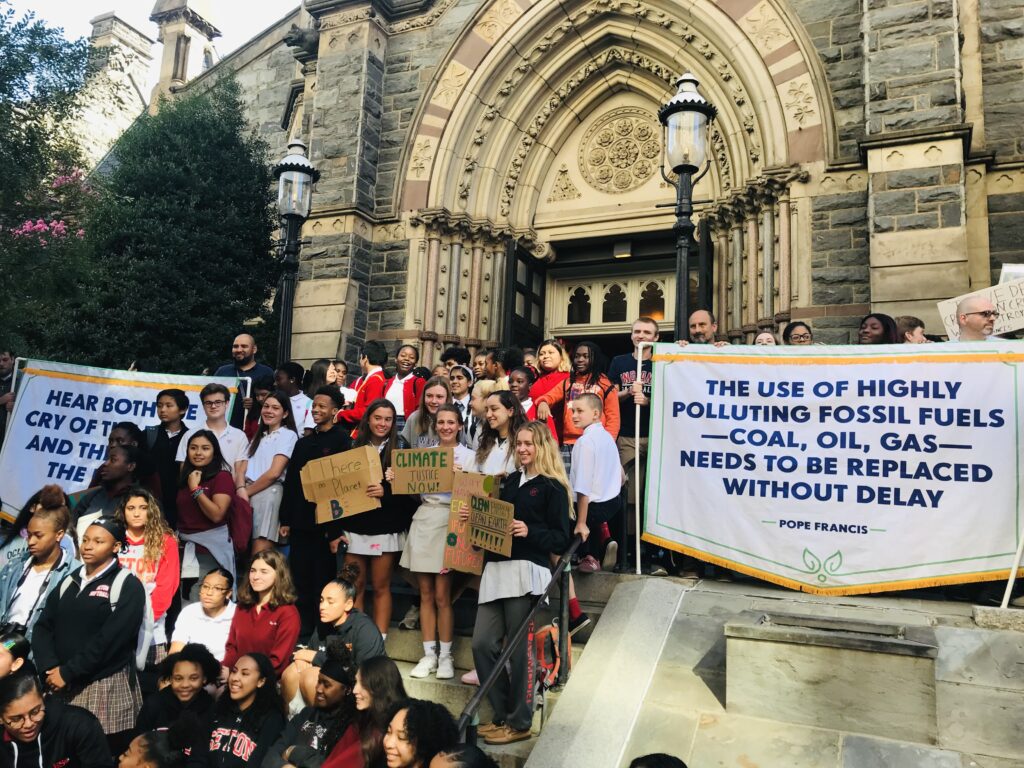
As Pope Francis says, we need a vision of “right” ordering so that what is best for the common good is attended to. It will require a personal and societal embrace of limitation, restraint, and humility (Laudato Si). In order to respond to the cries of Earth and the poor, paradigm shifts on many levels are needed. Politics, economics, social, cultural, and religious formations all need to shift away from structures of exploitation. We are called to a praxis of care oriented toward God’s desires. Specifically, we are urged to perceive creation as a “thou” as opposed to an “it.” How we view creation informs our praxis. If we approach nature without a sense of awe and wonder, our attitude will be that of masters, consumers, and ruthless exploiters. We will be unable to set limits on our immediate needs. If we feel intimately united with all that exists, solidarity and care will well up (no. 11, Laudato Si). God desires for us to care, protect, preserve, and oversee, and to live in communion with God, neighbor and Earth. If we live with care for Earth, we will find ourselves standing in solidarity with God’s preferential option for the poor.
Reflection Questions:
- What different ways of seeing emerged in you? How did Castillo challenge your own perspective of creation? In what ways were your own perspectives of creation affirmed?
- Let’s broaden our questions… How would Jesus urge us to address the problem of extractivism, especially as it devastates the care of Earth and the poor? What about Catherine’s advice—what would she say?
The Lens of Integral Ecology – Interconnectedness of all Life and Earth as Our Sustainer and Caretaker
[Shortened Version Here]
For the full document with several language options, click here… Pope Francis’ Encyclical, Laudato Sí’.
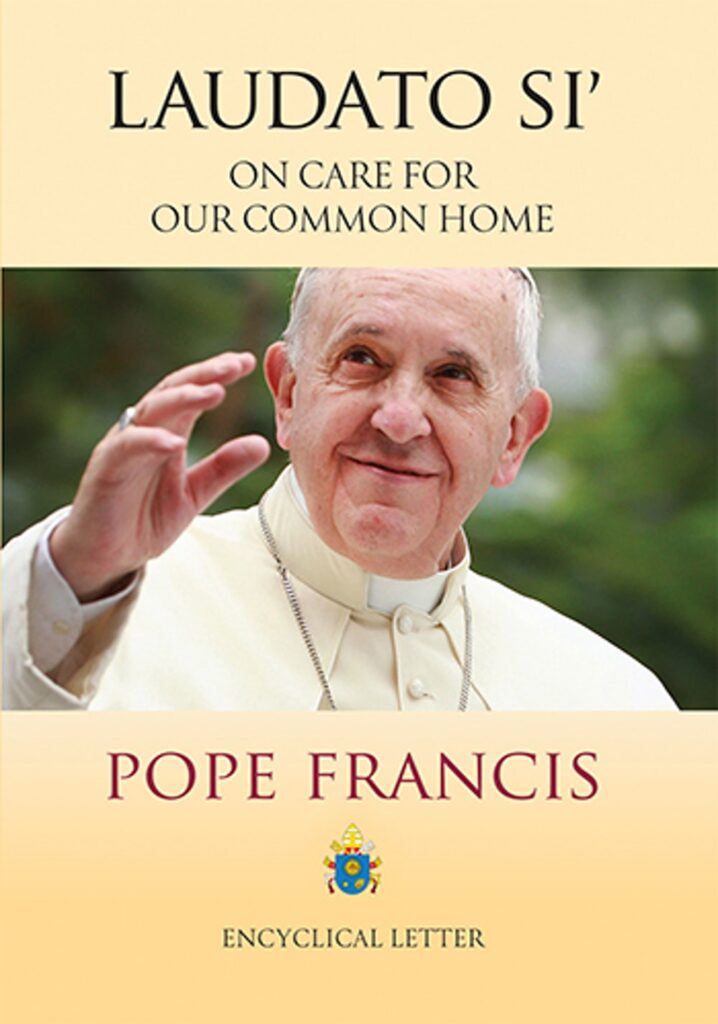
On May 24, 2015, Pope Francis shared with the world an encyclical letter, Laudato Sí’. In the tradition of Catholic Social Teaching, he discussed various human causes of environmental deterioration and he called the world to act in unity for the care and health of Earth.
Pope Francis begins by praising the beauty of Earth, our common home, and naming Earth as our sustainer and our caretaker. Earth produces flowers, food and other goods that benefit the creatures of Earth. Our very bodies are made up of Earth. We are interdependent with Earth. But Earth, Francis states, is sick. Water, air, and soil have been poisoned. And Earth, like those who have been made poor, has been abandoned and maltreated and her ecosystems are failing. Pope Francis himself states that he was not the first pope to address ecological concerns. In 1971, Pope Paul VI expressed in his encyclical Pacem in Terris a serious concern for the global escalation of industries and the exponential increase in destructive human activity. Scientific advances, technology and unbridled economic growth were among his deepest ecological concerns. Pope Paul stated that exploitation of nature would lead to tragic consequences. John Paul II in Redemptor Hominis raised concerns about destructive production and unrestrained consumption and called for conversion of lifestyle, a shift away from consumerism and a move toward a moral global ecology. Pope Francis points to other groups who share serious ecological concerns including scientists, theologians, and environmental organizations, as well as from Catholic and other Christian communities. The voices of alarm are increasing and uniting to make themselves heard.
In Laudato Sí, Pope Francis turned to the words of Bartholomew I, the patriarch of the Eastern Orthodox Christian Church. In June 2003, Bartholomew called each person to repent for their role in harming Earth. Humans have destroyed the biological diversity of God’s creation, degrading Earth’s ecosystems, stripping out natural forests, destroying the wetlands, contaminating waters, air, and land. Bartholomew urged repentance, noting that our sins against the natural world are sins committed against God and ourselves. But he goes further in calling for a change in how humanity treats Earth. We must address the ethical and spiritual roots of the problem. Technological solutions are not sufficient. Bartholomew calls us “to replace consumption with sacrifice, greed with generosity, wastefulness with sharing, a moving away from what I want to what God’s world needs.” He urges an ascetism that compels “learning to give, and not simply to give up.” Christians are called “to accept the world as a sacrament of communion, as a way of sharing with God and our neighbors on a global scale.” (LS 0.8-9).
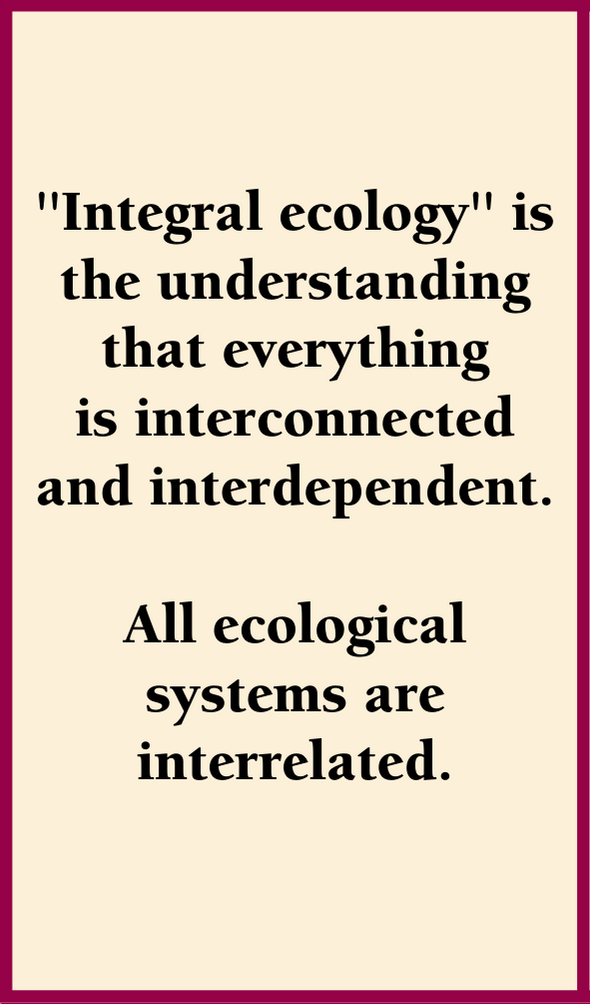
Inspired by St. Francis of Assisi, Pope Francis reminds us of the saint’s concern for God’s creation, for the poor and the outcast. He lived simply and in harmony with God, with others, with nature. Pope Francis explains a new concept for many of us referred to as “integral ecology.” What is “integral ecology”? The understanding that everything is interconnected and interdependent. All ecological systems are interrelated. Humans must play a critical role in redressing the damage caused to God’s creation. Each person is the answer to solving the crisis, no matter how small their efforts, whether one applies their talents to addressing a particular damage to Earth or reshapes their lifestyle to reduce or eliminate damage to Earth. We must all cooperate for the care of creation. Pope Francis notes two key elements needed for change to happen: motivation and the process of education. (LS 1.10-15)
What is striking about the acceleration of changes underway, is not the element of change itself. Change is ever present in complex systems, but human activity has accelerated the speed of change far beyond the “naturally slow pace of biological evolution.” Pope Francis addresses key areas of accelerated change: pollution, waste, and throwaway culture; the depletion of healthy water and water in general; the loss of biodiversity; the effect of pollution and privatization on human communities; the social and economic inequities; congestion and poverty of urban communities; and inequality. The deterioration of the environment and of society affects the most vulnerable, those made poorest among us. Pope Francis urges a global response that hears “both the cry of the earth and the cry of the poor.” The affluent live far removed from the cries of those who are poor. (LS 1.18, 48)
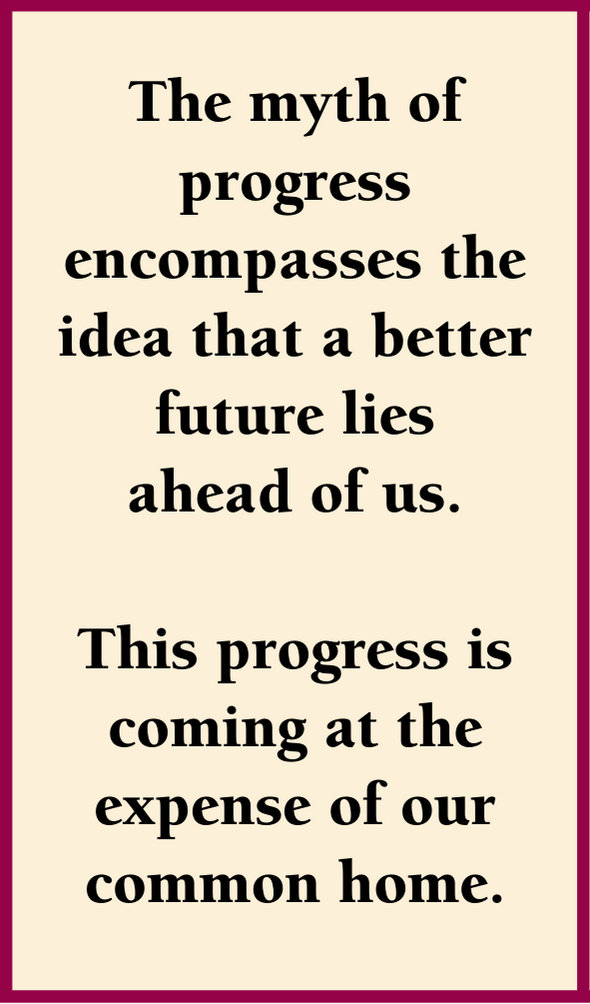
The global north has plundered the resources of the global south resulting in severe environmental and societal destruction. Francis cites examples like the use of mercury in gold mining. Rivers and other water sources have been polluted by mercury poisoning. The global north exacts more than plunder in taking the resources. It also deposits poisonous waste in the global south. Dangerous waste includes electronic parts from computers and smart phones. Francis adds, the global north does not want such poisonous waste in its own lands, so it deposits it in the lands where those who are poor cannot object. Food waste is another issue of concern. A third of all food produced, Francis notes, is discarded and never reaches the table of the hungry. Extreme and selective consumerism generates this waste. As resources dwindle or become depleted, wars break out. Although some progress has been made such as the cleaning of rivers and the restoration of forests, these renewal projects, in and of themselves, will not solve the global ecological problem. We are captivated by the myth of progress. We believe that a better future lies ahead of us through technological advances, but these advances themselves contribute to a culture of waste. In the name of progress and development, the destruction of our common home continues at a rapid pace. (LS 1.50-1.58)
An Integral Ecology
Pope Francis calls for a vision that considers the interrelatedness of all things. In short, working toward a sustainable solution to the global crisis requires an integrated approach.
Environmental, Economic and Social Ecology
Francis emphasizes that the physical, chemical, and biological aspects of Earth are interconnected. He urges us to question “certain models of development, production and consumption” that deteriorate and diminish this interrelatedness (4.138).
An integral ecology requires a shift in our perceptions. Are we unique and special in God’s creation and so the only creature beloved by God? Some important observations by Pope Francis in Laudato Sí include:
Scientific data shows that “much of our genetic code is shared by many living things.” Francis writes that “nothing stands in isolation, not time, space, atoms, subatomic particles. Nature is not something separate from us nor it is the mere setting in which we live.” The environment is the relationship that exists between nature and that which lives in it. Essentially, Francis believes that there is a deeply embedded interconnectedness and interrelationship with all of creation. To his point, “there are not two separate crises, an environmental one and a social one. One crisis is interwoven with the other crisis. Combating poverty and protecting nature are interrelated.
(LS 4.138-139)
Pope Francis urges the need for more ongoing research and education to help us understand Earth’s ecosystems and how these ecosystems regenerate and interrelate. The critical questions include how to foster economic growth that protects the environment. He insists that development cannot come at the expense of the environment. Effective legislation is needed to protect forests. Social institutions are needed to regulate human activity and relationships (LS 4.142). Without effective legislations and the development of social institutions, serious degradation will continue. The environment, ecosystems and human communities will continue to deteriorate through acts of injustice and corruption. Violence, the loss of freedom, and the destruction of lives will escalate (LS 4.140-4.142).
Cultural Ecology
The destruction of communities in the name of progress has devastating effects on the historic, artistic, and cultural inheritance of a place. The original identity is lost when cities and places are rebuilt. Local cultures must be incorporated into studies of the environment so that dialogues can occur between “scientific-technical language and the language of the people.” “Culture is more than what we have inherited from the past; it is also, and above all, a living, dynamic and participatory present reality.” Culture evolves from its past, and lives in the present. Local cultures have developed their own processes, which need to be respected and heard. Today’s globalized economy, Francis points out, tends to have a “levelling effect on cultures, diminishing the immense variety of heritages.” Resolving problems from the outside is not the adequate answer. Local cultures need to develop new processes through their own culture to preserve their heritage. The disappearance of culture is as serious as the extinction of a species. Francis urges respect and care for indigenous communities and their cultural traditions. Many indigenous are being pressured to abandon their lands so that “progress” can be made. What follows are agricultural and extraction projects that disregard and decimate nature and culture (LS 4.143-4.146).
Ecology of Daily Life
Pope Francis addresses concerns for the quality of daily life. The environment that people inhabit, especially the poor who live in densely populated urban settings, can be “chaotic, saturated with noise and ugliness” and lead to overstimulation and the feeling of asphyxiation. The people living in extreme poverty in such areas often lack harmonious open spaces, or beautiful safe spaces. In addition, social anonymity creates uprootedness, which leads to antisocial behavior and a rise in crime. Pope Francis urges a number of ways to enhance the environment in which persons who are poor live. Consideration in the design of buildings and planning of public spaces are examples of the ways and programs of mutual assistance. (LS 3.147-150)
Principle of the Common Good
For Pope Francis, the vision of an “integral ecology is inseparable from the notion of the common good.” He defines the common good as the principled respect of the human being, and of their basic and inalienable rights. The welfare of society depends on the well-being of its members and on their ability to live in peace, in security and with stability. Key to the development of the common good are the principles of subsidiarity (e.g., processes which that focus on organizing, decision-making and authority at the community level) and distributive justice (i.e., concerns that ensure a socially just allocation of resources). The pursuit of the common good requires a particular solidarity and a “preferential option of the poor,” who are the most vulnerable in society. Where more and more people are denied their human rights, where more and more people are perceived of as expendable, we are called to stand in solidarity with them. (LS 3.156-158).
Justice Between the Generations
Pope Francis also urges that a commitment to the common good must extend to future generations. The environmental and economic crises of the world are having detrimental effects on our common destiny. We are obligated to leave future generations with a just, and sustainable world. We cannot leave them an uninhabitable, debris-filled, desolate, and filthy planet. Rampant individualism, instant self-gratification, impulsive and wasteful consumption are just a few of the factors leading to the deterioration of a viable world for future generations. Francis makes an urgent appeal for intragenerational solidarity to address these issues (LS 3.159-162).
Moving Forward with an Integral Approach
Through Laudato Sí’, Pope Francis has urged us to take a deep look at our interconnectedness with the cries of those who are poor and the cries of Earth. Our lifestyles, our institutions, and our corporate and political decision-making processes continue to profoundly impact the lives of those who are economically poor and vulnerable women and their communities and cultures. We find ourselves called in an urgent response to a catastrophe already under way.
Our consumeristic consumptions, our support of multinational corporations, and our institutional structures are, in effect, creating a new kind of colonialism—a neo-colonialism that subjugates and exploits Earth and people for the benefit of the privileged. At the root of this neo-colonialism is the practice of extractivism. The purchase of products accrued through extractivism plays into this neo-colonialism. Extraction industries rely on processes like fracking and strip-mining. These industries insert themselves into communities, poisoning their land, water, and air destroying ecological and cultural diversity. These industries depict beautiful images of happy families, educated children and healthy communities on their webpages, but in reality, they promote violence against women and their families and open wide the door to human trafficking. They bring into these communities the horrific abuse of human rights, the suppression of culture and the escalation of labor conflicts. Communities become divided, disfigured, and displaced.
Everything is interconnected and interrelated. One eco-system effects another and brings the repercussion of our decisions back upon ourselves.
Reflection Questions:
- How do we commit to the principle of the common good that protects, serves, respects Earth and all of creation?
- How do we shape our lifestyles and corporate decision-making in ways that replenish the health of Earth and move us into meaningful solidarity with the persons and communities, who are most vulnerable?
- How do we respond to the most damaging activity of our time, extractivism?
- In what ways can we develop corporate decision-making processes that help us respond with urgency to cries of Earth and the poor?